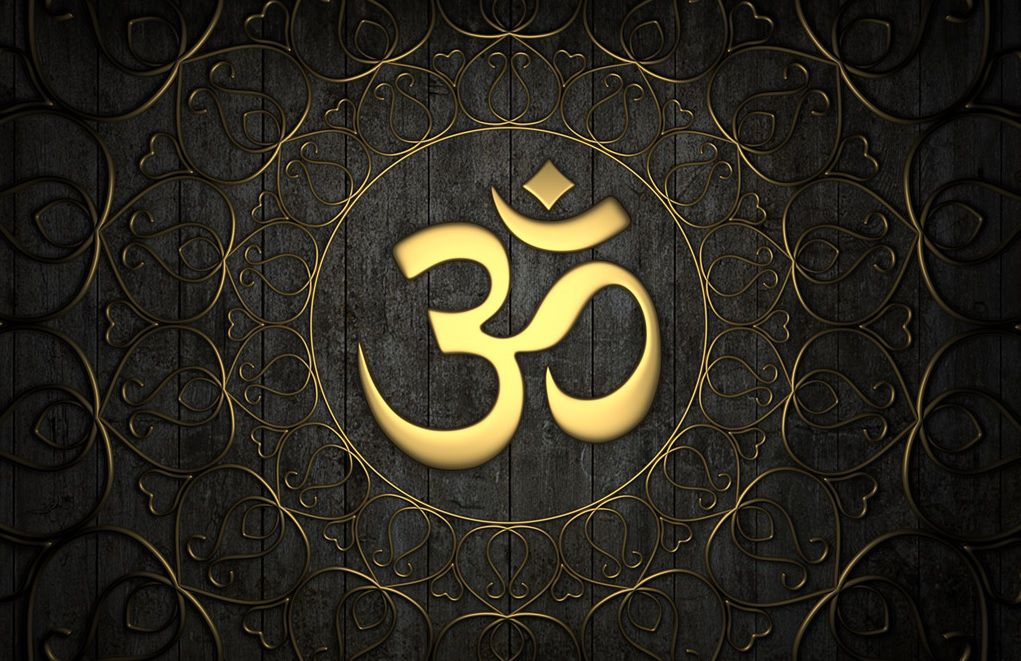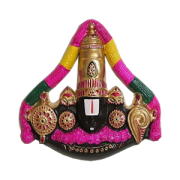No products in the cart.
The Vedic gods are those gods who feature prominently in the four Vedas. These gods were worshipped by the Vedic people. Their mode of worshipping was through rituals and sacrifices to the gods. According to the Vedas, the Brahman created Gods and humans in such a way that they had to be dependent on each other. Gods had power but could not make food for themselves and humans did not have power but they could make their own food. So gods helped the humans and the humans provided food to the gods. They received the food externally and internally. Externally through the sacrifices burned in the fire and internally through the digestive fire of our stomach. The Vedas speak of a lot of gods but the important once are mentioned more often than the others. The following is a list of the important gods and goddesses in the Vedas
Vedic Gods and Goddesses

INDRA
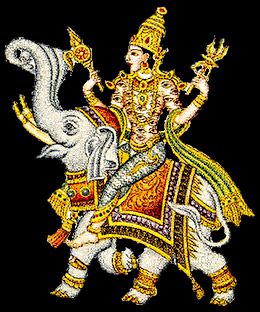 Indra is the most popular and praised god in the Vedas. In the Rig Veda, more than half the hymns invoke 3 gods, with Indra being the one who has the maximum number of hymns ( 250 hymns). He is the lord of the heavens. He is the god of thunder and rain and a great warrior. Vayu Devta is his friend and servant and the Vasus are his advisors. His Vahan is a white elephant called Airavata and has a weapon of lightning called Vajrayudh. His status and survival is the most important for him and he is always concerned about it. He goes to any lengths of scheming to keep his position as the leader. He fought many demons and brought victory to the gods. The slaying of Vratasura is his most famous achievement. Indra’s Kingdom is situated near Mount Meru and his love for Soma (Amruta, Elixir) is no secret. Indra is also depicted as someone who disguises himself to win over women. One such popular story is of Ahalya and Gautama Muni.
Indra is the most popular and praised god in the Vedas. In the Rig Veda, more than half the hymns invoke 3 gods, with Indra being the one who has the maximum number of hymns ( 250 hymns). He is the lord of the heavens. He is the god of thunder and rain and a great warrior. Vayu Devta is his friend and servant and the Vasus are his advisors. His Vahan is a white elephant called Airavata and has a weapon of lightning called Vajrayudh. His status and survival is the most important for him and he is always concerned about it. He goes to any lengths of scheming to keep his position as the leader. He fought many demons and brought victory to the gods. The slaying of Vratasura is his most famous achievement. Indra’s Kingdom is situated near Mount Meru and his love for Soma (Amruta, Elixir) is no secret. Indra is also depicted as someone who disguises himself to win over women. One such popular story is of Ahalya and Gautama Muni.
VARUNA
Varuna is the ruler of the world and enforcer as well as upholder of law and order in this world. He has supreme 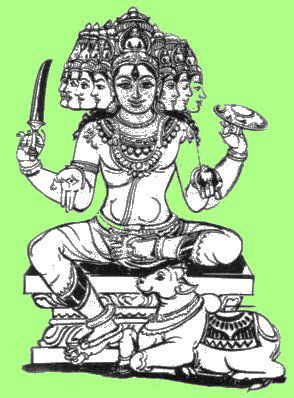 knowledge and knows everything happening in this world. He is the protector of this world. Everything in this world happens through his wishes. He has thousand eyes and oversees the whole world. Hence he is the God of the moral law. He punishes those who transgress from this law but forgives them out of compassion if they repent and pray. By activating Vayu, the lord of the wind, he sustains life by giving rain and crops. Though Varuna was the chief deity in the beginning, he seems to have yielded his place later on to Indra and Prajapati.
knowledge and knows everything happening in this world. He is the protector of this world. Everything in this world happens through his wishes. He has thousand eyes and oversees the whole world. Hence he is the God of the moral law. He punishes those who transgress from this law but forgives them out of compassion if they repent and pray. By activating Vayu, the lord of the wind, he sustains life by giving rain and crops. Though Varuna was the chief deity in the beginning, he seems to have yielded his place later on to Indra and Prajapati.
In the subsequent mythological literature Varuna is described as the presiding deity of the western quarter and as the lord of oceans, water and aquatic animals.He is depicted as a rider of chariots pulled by 7 swans and he has four hands.
AGNI
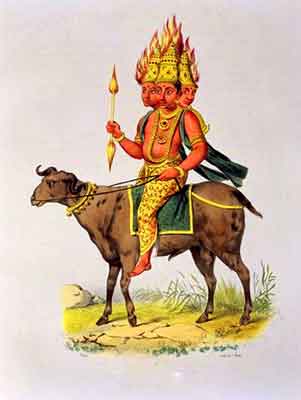 Agni is the master of sacrifices and wealth. No sacrifice is complete without his presence. His presence makes the sacrifice successful because he sends those sacrifices to the gods. He is the messenger as well as the priest of gods. He is kind and giving and loved by many. He is depicted as having 2 heads, 6 eyes, 7 hands, 3 legs and 4 horns with a pot belly and long flowing hair.
Agni is the master of sacrifices and wealth. No sacrifice is complete without his presence. His presence makes the sacrifice successful because he sends those sacrifices to the gods. He is the messenger as well as the priest of gods. He is kind and giving and loved by many. He is depicted as having 2 heads, 6 eyes, 7 hands, 3 legs and 4 horns with a pot belly and long flowing hair.
He is said to be a son of Dyaus and Prithivi; he is also called the son of Brahma, and is then named Abhimani; and he is reckoned amongst the children of Kasyapa and Aditi, and hence one of the Adityas. In the later writings of hinduism, he is described as a son of Angiras, king of the Pitris (fathers of mankind), and the authorship of several hymns is ascribed to him.
The 7 Names of Agni
Agni has many names: Vahni (who receives the hom, or burnt sacrifice); Vitihotra, (who sanctifies the worshipper); Dhananjaya (who conquers riches); Jivalana (who burns); Dhumketu (whose sign is smoke); Chhagaratha (who rides on a ram); Saptajihva (who has seven tongues).
RUDRA
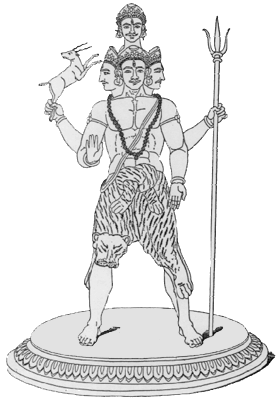 Rudra is the god of storm and lightning. He is also the ‘bringer and provider of medicines’. He wields the lightning bolt and bow and arrow and sends down lightening which brings fear to people as well as animals. He is fierce and well built. He is golden in color with braided hair. He is strong and and adorns himself in golden ornaments.
Rudra is the god of storm and lightning. He is also the ‘bringer and provider of medicines’. He wields the lightning bolt and bow and arrow and sends down lightening which brings fear to people as well as animals. He is fierce and well built. He is golden in color with braided hair. He is strong and and adorns himself in golden ornaments.
Rudra is frequently depicted in the Vedas as a terrifying character, representing the numinous aspect of God with fear-inspiring abilities such as that which causes disease. In contrast, Rudra also possesses milder characteristics such as the ability to heal. These opposite characteristics are a result of the considerable amount of syncretism of regional and tribal gods that took place under his name. Rudra is also believed to be an early form of Lord Shiva, the lord of destruction, and due to the complex mythological and religious link between the two deities, they are often referred to together as Rudra-Shiva.
Rudra & Shiva
In the later Vedas, Rudra is depicted to have inherited new monikers such as Bhava, Sarva, Mahadeva, and Shiva, most of which were probably names of regional or indigenous gods of non-Aryan of non-Vedic origin. In the divine persona of Rudra the traits of these deities seem to have been syncretized into one supreme god. By the time of the Upanishads, Rudra had assumed all the characteristics of a single, Supreme Lord, such as omnipotence, omniscience, and transcendence. In the Svetasvatara Upanishad particularly, Rudra-Shiva is proclaimed to be identical with Purusha, the primordial man, and even Brahman, the monistic essence of the universe. By this time, Rudra was also perceived to be protector and creator of all things, and had begun to more closely resemble the god currently known to Hindus as Shiva. The following verse from the Svetasvatara Upanishads illustrates the immense power attributed to Rudra:
“He who is the source and origin of the gods
The ruler of all, Rudra, the great seer,
Who of old created the Golden Germ” – (from Svetasvatara Upanishad III.4)
This verse foreshadows the importance that Rudra would come to attain after transforming into Shiva.
In the Yajurveda, the theonym “Shiva” was at first used in order to distinguish Rudra’s auspicious nature from his fierce appearance. Shiva also assumed Rudra’s status as a divine “outsider,” keeping residence well away from society in the Himalayas. Because of the complexly interwoven relationship between Rudra and Shiva, scholars often refer to both gods as a collective entity, “Rudra-Shiva,” in order to acknowledge their fusion in Hindu myth and worship.
MITRA
Mitra is also the guardian of the world along with Varuna. Together they look after the world and uphold the order. They make all the things happen in this world- from the river flowing to the rain falling. Mitra is associated with the morning light while Varuna is associated with the night sky.
In the Rigveda, the oldest of the Vedic texts, Mitra is mostly indistinguishable from Varuna, together with whom Mitra forms a dvandva pair Mitra-Varuna, and in which Mitra-Varuna has essentially the same characteristics as Varuna alone. Varuna is not only the greater of the two, but also — according to RV 2.12 — the second-greatest of the RigVedic gods after Indra.
VAYU
Vayu is the lord of beauty and intelligence. He as a swift mind and is also called the lord of thoughts. He is considered to be very intelligent and he brings light to the earths and heaven. He is depicted as being blue in color with four hands. Two of the hands hold a fan and a flag respectively while the other two hands are in abhaya and varada mudras.
SURYA
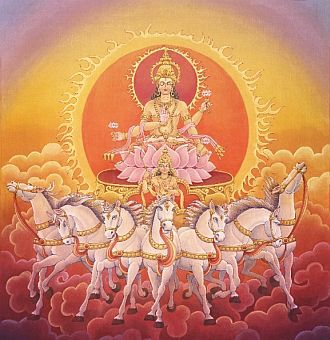 Surya is the lord of light and power. He keeps the darkness at bay with the light radiating from him. He destroys diseases and hence gives good health to people. He is the maker of light and illuminates the world of humans as well as the gods. He is depicted as being golden with radiant hair. He is seen riding swiftly across the sky in his golden chariot drawn by 7 horses.
Surya is the lord of light and power. He keeps the darkness at bay with the light radiating from him. He destroys diseases and hence gives good health to people. He is the maker of light and illuminates the world of humans as well as the gods. He is depicted as being golden with radiant hair. He is seen riding swiftly across the sky in his golden chariot drawn by 7 horses.
Surya and Savitri are two names by which the Sun is commonly addressed in the Vedic hymns. Sometimes one name is used exclusively, sometimes they are used interchangeably, and sometimes they are used as though they represented quite distinct objects. It is supposed that Savitri refers to the sun when invisible; whilst Surya refers to him when he is visible to the worshippers.
Although the hymns in which Surya is addressed are not very numerous, his worship was most common in the olden time, and has continued to the present hour. It is to him that the Gayatri, the most sacred text of the Vedas, is addressed at his rising by every devout Brāhman. Simple in its phraseology, this short verse is supposed to exert magical powers. It is as follows:—
“Let us meditate on that excellent glory of the divine Vivifier;
May he enlighten (or stimulate) our understandings.”
VISHNU
Vishnu is a kind and loving god. He is the protector of people. He upholds the threefold existence i.e. the heaven, the earth and the living creatures. It is said that is incarnation ‘Vamana’ covered both the heaven and earth in two steps and crushed the demon Bali in the third step.
SAVITR
Savitr is also considered the sun lord like Surya. But unlike Surya who represents the blazing sun, Savitr represents the hidden sun- it’s the sun before the sun rise and after the sunset. He is described as having golden eyes, golden hands and golden tongue.
PUSAN
Pusan is considered to the lord of paths and a guardian of cattle’s. He protects the people from wild animals and does not allow them to stray onto dangerous paths. He keeps their journey stable and obstacle free. He keeps people away from harm and drives away enemies. He is also the friend of Indra and Surya.
USHA
Usha is dawn and a daughter of the sky. She is the one that wakes up every living creature when the sky starts to lighten up. She is the goddess of light and beauty as she brings light and everything beautiful into the lives of the humans.
SOMA
He is the god of Inspiration. He gives the gods and human’s inspiration to get up and do things. It gives joy and bliss and rids people of diseases. He is the strength of gods and mortals and keeps everyone stable. He is also the lord of speech as he has influence on the movement of our speech.
ASHVINS
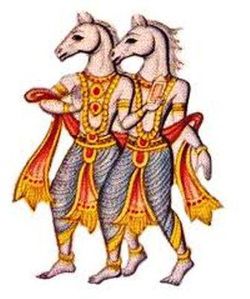 They are twin deities and are the brothers of Usha. They travel in a chariot with three spokes. They have healing and curative powers. It is believed that they come to the earth thrice a day and help mortals by providing them heavenly medicine. In the Rig Veda, the are prominently featured, and are said to be the sons of Saranyu (the daughter of Tvashta) and Vivasvant. They are also said to be the sons of heaven (Dyaus). Pusan is said to be their son.
They are twin deities and are the brothers of Usha. They travel in a chariot with three spokes. They have healing and curative powers. It is believed that they come to the earth thrice a day and help mortals by providing them heavenly medicine. In the Rig Veda, the are prominently featured, and are said to be the sons of Saranyu (the daughter of Tvashta) and Vivasvant. They are also said to be the sons of heaven (Dyaus). Pusan is said to be their son.
The two brothers are forever youthful, handsome, brilliant, golden, fast, and athletic. Compassionate, they help those in need from old women to soldiers left behind by a retreating army. They also represent duality, can change their form at will, and possess the power to cure. Indeed, this latter ability meant that they are the subject of many Hindu hymns as they are considered the official doctors of svarga, one of the intermediary heavens and realm of Indra.
MARUTS
They are the lords of storm and destruction. They bring about huge storms that shake the earth and bring darkness even during day time. They are ferocious. In spite of this they are not wicked. They work for the welfare of man and give them strength to overcome obstacles and become rich.
EIGHT VASUS
The eight vasus are – Dhara (earth), Apa (water), Anala (fire), Anila (wind), Dhruva (pole star), Soma (moon) and Prabhasa (light). They are the attendants of Lord Indra. They eventually attained popularity in different areas.
12 ADITYAS
The 12 Adityas are the 12 lords of light. They represent the 12 months in a year or the 12 spokes of a clock. They are the upholder and enforcer of law. They bring light to the world and drive away the darkness. They never sleep and are always protecting everyone from evil and harm.
BRIHASPATI
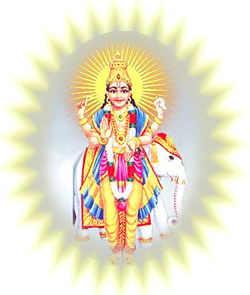
He is the friend of Lord Indra and is considered to be the giver of wisdom and wealth. He drives away diseases and protects them from enemies. No sacrifice is complete without his presence as he is the priest of heaven. He sees to it that the unworthy do not enter.
BHAGA
Bhaga is the son of Aditi and he is a giver of blessings and gifts. He is kind and gives very generously. That’s why everyone- rich or poor approach him.
RTA
Rta is the god of rhythmic patterns. She determines and looks over any form of pattern in this world. She determines the way the planets assign themselves, the way the seasons come and go, the cycle of life and death etc.
RBHUS
Rbhus are skilled craftsmen. They are the sons of Sudhavan and are considered to have powers that make them very good with their hands and the work they do. Due to their craftsmanship they were promoted to the ranks of god.
YAMA
Yama is the lord of Justice and the ruler of the dead that go to hell. He has two dogs that have four eyes and wide nostrils. They guard the way to the world of Yama. He is shown as riding a he buffalo carrying a mace and noose which he uses to drag the dead to hell. He looks over the deeds of people and provides them with the appropriate punishment.
MANYU
Manyu is considered to the lord of war. He fights and slays the enemy and removes evil. He is fierce and strong and gives wealth and safety to the people.
PRAJANYA
Prajanya is the Lord of rain. He is controller of lightning and thunder. He is feared by all life forms. He makes travelling through deserts possible by bringing down rain. He can make plants grow through rain. When he fills the sky with rain clouds, winds start and lightning flashes. He is also the upholder of law as he punishes those who sin and protects the people.
SARASWATI
Saraswathi is the goddesses of the river. She has seven sisters. She is the helper of gods. She punishes people that look down upon god. She is also a giver of water to the people. She provides people with strength as well as wealth.

